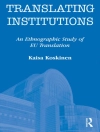In the wake of recent federal legislation entitled No Child Left Behind, high-stakes standardized testing for accountability purposes is being emphasized in educational systems across the U.S. for all students – including English Language Learners (ELLs). Yet language proficiency mediates test performance, so ELLs typically receive scores far below those of other students. This book explores how tests have become de facto language policy in schools, shaping what is taught in school, how it is taught, and in what language(s) it is taught. In New York City, while most schools responded to testing by increasing the amount of English instruction offered to ELLs, a few schools have preserved native language instruction instead. Moreover, this research documents how tests are a defining force in the daily lives of ELLs and the educators who serve them.
Innehållsförteckning
Content
Acknowledgement
PART I: Language Policy Context
1. Introduction
2. Language Policy, Federal Education Legislation, and English Language Learners in the United States
3. The New York Case: The Local Implementation of a National Policy
PART II: Standardized Tests in Daily School Life
4. Tongue-Tied: The Linguistic Challenges that Standardized Tests Pose for English Language Learners
5. The Ones Left Behind: How High-Stakes Tests Impact the Lives and Schooling Experiences of ELL Students
6. “Teaching to the Test” as Language Policy: The Focus on Test Preparation in Curriculum and Instruction for ELLs
PART III: Expansion & Recommendations
7. Higher Expectations vs. Language as Liability: Why the Drawbacks of Accountability Outweigh the Benefits for English Language Learners
8. High-Stakes Testing and Language Un-Planning: Theoretical Implications of Testing as Language Policy
9. Moving Forward: Embracing Multilingual Language Policies from the Top-Down to the Bottom-Up
Om författaren
Kate Menken is Professor of Linguistics at Queens College of the City University of New York (CUNY. She is Co-Editor in Chief of Language Policy. Her research interests include language education policies, bilingual education, and the experiences of emergent bilinguals and their families in U.S. public schools.












